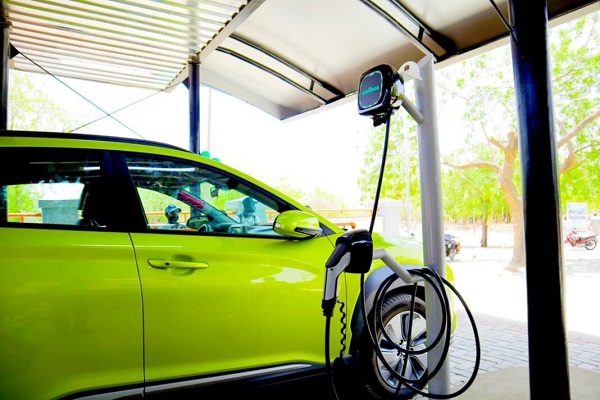In a major step towards clean and sustainable transport, Foltï Technologies Limited has launched eDryv, Nigeria’s first electric vehicle (EV) ride-hailing service powered by 95 per cent green energy.
The service will begin accepting bookings on Sunday, April 13, 2025, starting in the Lagos Island area.
eDryv is not just a ride-hailing platform, it’s a full transportation-as-a-service (TaaS) model offering ride-hailing, vehicle rentals, and corporate transport solutions.
The initiative is designed to tackle Nigeria’s rising fuel costs, air pollution, and electricity shortages by providing safe, affordable, and eco-friendly mobility options.
Speaking at the unveiling, Ahmad Damcida, Principal and Founder of Foltï Technologies, explained that eDryv’s electric vehicles are powered by solar energy stored in battery systems.
“We don’t depend on the national grid. We generate our own electricity—95 per cent of which is from solar power. Everything was designed and installed locally,” Damcida said.

To make green travel more accessible, eDryv offers fares below the market average, charging less than N320 per kilometer. Users also earn Green Coins, a reward system that allows them to receive discounts on future rides based on their zero-emission travel distance.
“We want Nigerians to benefit directly from choosing cleaner transportation,” Damcida said. “Every kilometer in an EV saves carbon and earns you rewards.”
Having spent nearly 20 years in the oil and gas sector, Damcida said the move to renewable energy is deliberate and necessary. “We know the oil business well, but we also know it’s time to decarbonize.”
EVs are easier to maintain and better suited to Africa, where cars often go through multiple owners.”
To ensure long-term sustainability, Foltï Technologies plans to recycle EV components, including batteries, after their 7 to 8-year lifespan, rather than reselling old vehicles.
Unlike traditional car sales, eDryv vehicles are not for sale. “Each vehicle costs around ₦44 million, which is not affordable for most people,” Damcida noted. “We offer them as a service to eliminate the ownership burden.”
Currently, eDryv operates two vehicle models, the Dayun MPV and the Dayun SUV. The MPV has a range of 450 km with a 72.27 kWh battery, while the SUV offers a 330 km range on a 36.6 kWh battery, according to Emmanuel Anagbe, Head of Operations and Maintenance at eDryv.
“Our service targets both individual and corporate users,” Anagbe said. “We provide ride-hailing, rentals, and transport services for companies.”
eDryv is starting with a pilot phase across Lagos Island and parts of the Mainland to test operations and gather feedback. The commercial phase will follow, featuring over 231 EVs and at least three major charging stations.
Currently, the company operates a fully functional solar-powered charging hub at its Agungi head office in Victoria Island. Plans are in place to build two more hubs, one on Farm Road, Mainland Lagos, and another between Marina and Ajapa.
“Electric mobility is still new here,” Anagbe said. “We’re using the pilot to understand the terrain and public reception before scaling.”
The project has received praise from stakeholders, including Engr Dapo Adeshina, President of the Electric Mobility Promoters Association of Nigeria (EMPAN). He described eDryv as a breakthrough for Nigeria’s green transport sector.
“eDryv shows us the future of transport in Nigeria,” said Adeshina. “It offers an entire ecosystem—from ride-hailing and rentals to clean energy infrastructure.”
EMPAN, which was established in October 2024, promotes e-mobility nationwide. Adeshina emphasized that e-mobility includes not only EV cars, but also electric bikes and tricycles.
“Transportation is responsible for over 22% of greenhouse gas emissions,” he said. “Switching to EVs can drastically cut pollution, improve air quality, and reduce respiratory illnesses.”
eDryv also incorporates smart technology through telematics, enabling real-time monitoring of driver behavior, route efficiency, and vehicle health to enhance customer experience.
The Agungi charging hub operates mostly on solar power, with a 460 kWh storage system that requires just one hour of public power daily. Each of its eight 30 kW charging ports can handle various EV models, helping reduce “range anxiety” among users.
EMPAN sees huge economic potential in the EV space, from assembling vehicles locally to creating jobs in charging infrastructure and mobility tech. Already, eDryv is planning an EV assembly plant in Abeokuta, Ogun State, with operations expected by 2026 or 2027.
However, Adeshina called for more government support to scale e-mobility across Nigeria. He urged the federal government to remove import duties on EVs, streamline port clearances, and provide loan options for EV drivers.
“EVs are cleaner and safer than compressed natural gas (CNG) options,” he said. “And with proper financing, drivers can eventually own these vehicles.”
Despite the high purchase cost, EV ride-hailing remains cheaper than fuel-based services. A trip from Victoria Island to the airport in an EV costs around ₦12,000 compared to ₦18,000 on Bolt.
With forward-thinking leadership, sustainable infrastructure, and community engagement, eDryv could help Nigeria become a continental leader in clean, smart transportation.
“This isn’t just about mobility,” Damcida concluded. “It’s about building a healthier, more sustainable future for Africa.”



